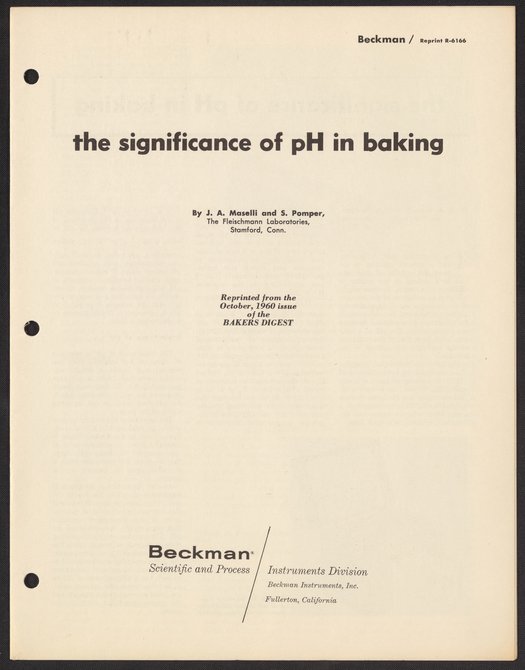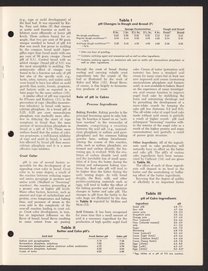The Significance of pH in Baking
Beckman Reprint R-6166
- 1960-Oct

Rights
Download all 6 images
PDFZIPof full-sized JPGsDownload selected image
Small JPG1200 x 1531px — 170 KBFull-sized JPG2708 x 3456px — 833 KBOriginal fileTIFF — 2708 x 3456px — 26.8 MBThe reprinted article, originally published in Bakers Digest, was written by employees of the Fleischmann Laboratories and featured photographs of Beckman pH meters.
Arnold Beckman invented his first pH meter in 1934 at the request of a chemist from the California citrus industry, who needed an accurate way to measure the acidity of his product. The resulting instrument kicked off rapid development not only of Beckman Instruments, Inc. but also of the electronic scientific instrument industry.
| Property | Value |
|---|---|
| Author | |
| Format | |
| Genre | |
| Extent |
|
| Language | |
| Subject | |
| Rights | In Copyright - Rights-holder(s) Unlocatable or Unidentifiable |
| Credit line |
|
Institutional location
| Department | |
|---|---|
| Collection | |
| Series arrangement |
|
| Physical container |
|
View collection guide View in library catalog
Related Items
Cite as
Pomper, S., and J. A. Maselli. “The Significance of PH in Baking,” October 1960. Beckman Historical Collection, Box 19, Folder 20. Science History Institute. Philadelphia. https://digital.sciencehistory.org/works/db78tc523.
This citation is automatically generated and may contain errors.
Rights
Download all 6 images
Searchable PDFmay contain errorsZIPof full-sized JPGsDownload selected image
-
Keyboard Shortcuts
Previous image shift + or , Next image shift + or . Pan image Zoom in + or shift + Zoom out - or shift + Zoom to fit 0 Close viewer esc Also
Mouse click to zoom in; shift-click to zoom out. Drag to pan. Pinch to zoom on touch.










